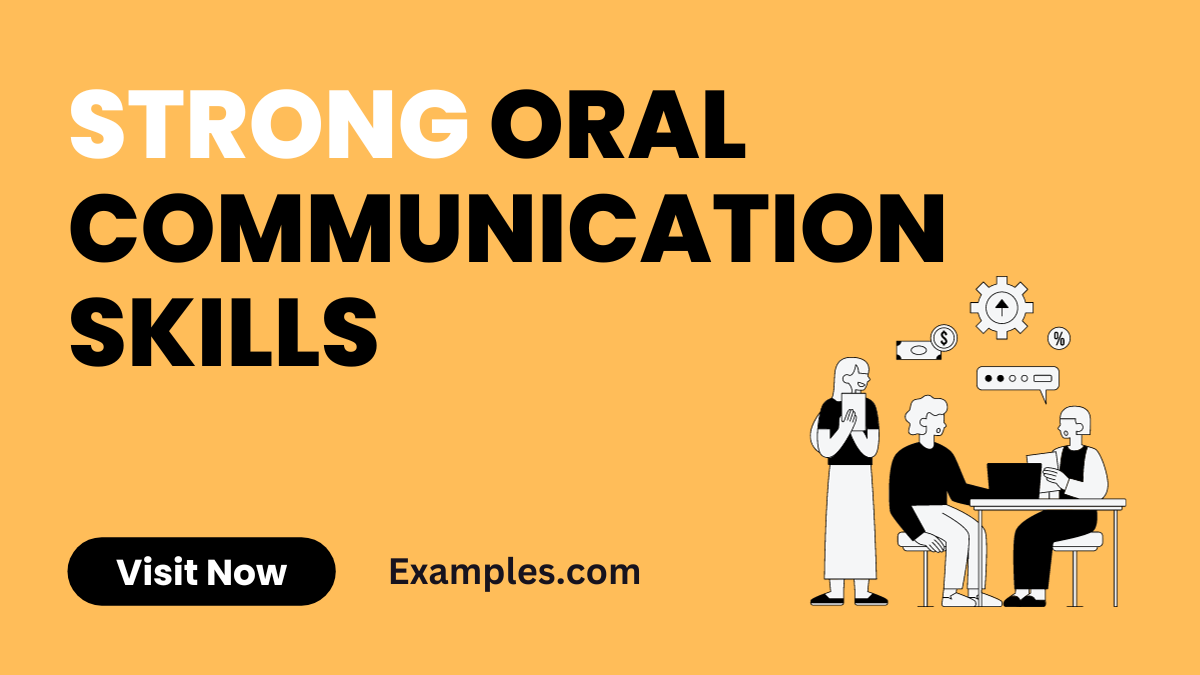10 Strong Oral Communication Skills Examples
In today’s fast-paced world, strong oral communication skills are more crucial than ever. This comprehensive guide offers a deep dive into effective speaking techniques, enriched with real-world Oral Communication Examples. Whether you’re a student, professional, or public speaker, our insights will enhance your speaking prowess. Learn how to articulate your thoughts clearly, engage audiences, and convey your messages with impact. From mastering the art of persuasion to refining your public speaking skills, this guide is your key to unlocking the power of your voice.
What are Strong Oral Communication Skills?
Strong oral communication skills refer to the proficient ability to articulate thoughts and ideas effectively using speech. These skills are not just about speaking but also involve clarity, conciseness, and the ability to engage and persuade an audience. Excelling in oral communication means understanding and implementing elements like tone, pace, and body language. It plays a vital role in various domains, including Oral Communication in the Workplace and Public Speaking. The mastery of these skills facilitates successful Information Dissemination and aids in achieving clear, impactful communication in both personal and professional settings.
Strong Oral Communication Skills in the Workplace

In the professional realm, Strong Oral Communication Skills are indispensable. They are not just about articulating thoughts but also about understanding and adapting to the workplace dynamics. Effective oral communication in the workplace leads to better teamwork, efficient problem-solving, and enhanced leadership.
Key aspects include:
- Active Listening: Paying attention to what others say, and responding appropriately.
- Clarity and Conciseness: Making points clearly and avoiding unnecessary jargon.
- Confidence: Speaking assertively, showing authority, and confidence in your knowledge.
- Feedback: Giving and receiving constructive feedback.
- Adaptability: Tailoring your communication style to different situations and audiences.
Applying these skills in the workplace can lead to improved Oral Communication in Business transactions, team meetings, and client interactions, enhancing overall organizational effectiveness.
Strong Oral and Written Communication Skills
Balancing Strong Oral and Written Communication Skills is key in today’s multifaceted communication landscape. While oral skills involve speaking and listening, written skills focus on composing and understanding written messages.
Key distinctions and synergies include:
- Medium: Oral communication is often spontaneous and dynamic, while written communication provides a permanent record and is well-thought-out.
- Feedback: Oral communication allows immediate feedback, whereas written communication’s feedback is often delayed.
- Tone and Body Language: Oral communication relies heavily on vocal tone and body language, whereas written communication depends on word choice and punctuation to convey tone.
Integrating strong oral and written skills is crucial for comprehensive communication strategy. Effective Oral Communication in Social Work, presentations, and networking benefits from a blend of both these skills. Mastering this combination can lead to better understanding, clearer messaging, and more effective communication in both personal and professional contexts.
The Importance of Strong Oral Communication Skills
Strong oral communication skills are vital in both personal and professional settings. They are crucial for effective interpersonal interactions, successful professional networking, and efficient workplace communication.
Key aspects that highlight their importance include:
- Enhancing Relationships: Effective oral communication fosters healthy personal and professional relationships.
- Career Advancement: Proficiency in oral communication often correlates with leadership abilities, influencing career growth and opportunities.
- Problem-Solving: Clear communication is essential in resolving conflicts and brainstorming solutions.
- Persuasion and Influence: Convincing and persuading others is a critical aspect in various fields like sales, management, and education.
- Cultural Understanding: In our globalized world, strong communication skills aid in crossing cultural barriers and building mutual respect.
These skills are not only about speaking but understanding the dynamics of Human Interaction, which is fundamental in fields like Oral Communication in Social Work and Business.
Benefits of Strong Oral Communication Skills

The benefits of possessing strong oral communication skills are far-reaching and can significantly impact various aspects of life.
Key benefits include:
- Improved Self-Esteem: Confidence in speaking leads to improved self-worth and assertiveness.
- Enhanced Professional Image: Effective communicators are often perceived as more competent and trustworthy.
- Better Decision Making: Clear communication helps in gathering information and making informed decisions.
- Efficient Teamwork: Teams with strong communicators tend to work more cohesively and efficiently.
- Influential Leadership: Leaders with excellent oral communication skills can inspire and motivate their teams effectively.
Overall, strong oral communication skills are not just an asset but a necessity in today’s fast-paced world, enhancing both personal growth and professional success. Whether it’s for delivering a powerful presentation or engaging in a meaningful conversation, these skills ensure your message is heard and understood, reinforcing the Importance of Oral Communication in various spheres of life.
In conclusion, strong oral communication skills are essential for effective interaction and success in various life aspects. This guide has illuminated the path to enhancing these skills, providing practical tips and insights. Whether in personal relationships, the workplace, or public speaking, mastering oral communication can lead to significant personal and professional growth, underlining its indispensable value in today’s world.



